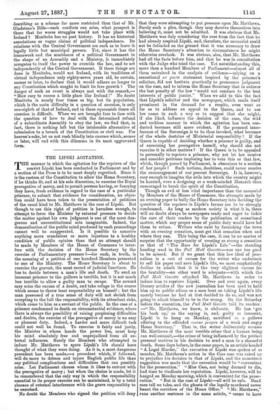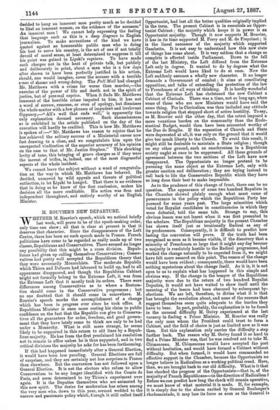THE LIPSKI AGITATION.
THE manner in which the agitation for the reprieve of the convict Lipski has been conducted in Parliament and by a section of the Press is to be most deeply regretted. Since it is the custom of the constitution to allow the Home Secretary, if he thinks fit, and at his sole discretion, to exercise the Royal prerogative of mercy, and to permit persons having, or fancying they have, fresh evidence in regard to the case of a particular prisoner, to submit that evidence for consideration, no objec- tion could have been taken to the presentation of petitions of the usual kind to Mr. Matthews in the case of Lipski. But though to use this right of petition is harmless enough, to attempt to force the Minister by external pressure to decide the matter against his own judgment is one of the most dan- gerous and unconstitutional acts imaginable. Indeed, the demoralisation of the public mind produced by such proceedings cannot well be exaggerated. Is it possible to conceive anything more scandalous or more injurious to a healthy condition of public opinion than that an attempt should be made by Members of the House of Commons to inter- fere with the decision of the Home Secretary by the exercise of Parliamentary pressure I—for suoh, in truth, is the meaning of a petition of one hundred Members presented to one of the Ministry. The Home Secretary is about to exercise the gravest, the most sacred of judicial functions. He has to decide between a man's life and death. To send an innocent prisoner to the gallows is terrible, but it is not much less terrible to allow a guilty man to escape. The coward may seize the excuse of a doubt, and take refuge in the course which seems to throw least responsibility on himself ; but the man possessed of a true sense of duty will not shrink from accepting to the full the responsibility, with its attendant risks, which come to him as a servant of the public. In the case of a prisoner condemned to death on circumstantial evidence, where there is always the possibility of raising perplexing difficulties and doubts, the exercise of the prerogative of mercy is no easy or pleasant duty. Indeed, a harder and more difficult task could not well be found. To exercise it fairly and justly, the Minister in whose hands the power lies, must keep his mind absolutely free and unprejudiced from all ex- ternal influences. Surely the Members who attempted to induce Mr. Matthews to spare Lipski's life should have thought of what they were doing. As it is, a most dangerous precedent has been made,—a precedent which, if followed, will do more to debase and injure English public life than any political complications and difficulties that can possibly arise. Let Parliament choose whom it likes to entrust with the prerogative of mercy ; but when the choice is made, let it be remembered that the only way in which the responsibility essential to its proper exercise can be maintained, is by a total absence of external interference with the grave responeibity to be exercised.
No doubt the Members who signed the petition will deny that they were attempting to put pressure upon Mr. Matthews. Surely such a plea, though they may deceive themselves into believing it, must not be admitted. It was obvious that Mr. Matthews was duly considering the case from the fact that he had already respited Lireki, and, therefore, the memorial could not be defended on the ground that it was necessary to draw the Home Secretary's attention to circumstances he might otherwise overlook. It was obvious, also, that Mr. Matthews had all the facts before him, and that he was in consultation with the Judge who tried the case. Yet notwithstanding this, more than a hundred Members of Parliament—almost all of them untrained in the analysis of evidence—relying on a sensational ex parte statement inspired by the prisoner's solicitor, did not hesitate practically to pronounce judgment on the case, and to inform the Home Secretary that to enforce the last penalty of the law " would not conduce to the best interests of public justice." When we add to this the fact that Lipski's solicitor and the newspaper, which made itself prominent in the demand for a respite, even went so far as to address an appeal to the Queen, and to use her name in such a way as to suggest that she might, if she liked, influence the decision of the case, the wild and reckless manner in which the agitation has been con- ducted becomes still more evident. If the personal inter- ference of the Sovereign is to be thus invoked, what becomes of the whole doctrine of Ministerial responsibility ? If the Queen is capable of deciding whether a prisoner is guilty, and of exercising her prerogative herself, why should she not exercise it in other matters ? If the Queen is to be appealed to personally to reprieve a prisoner, why not let her receive and consider petitions imploring her to veto this or that law, which, though passed by Parliament, is obnoxious to a section of her people ? Such notions, doubtless, could never receive the encouragement of our present Sovereign. It is, however, easy enough to imagine the evils into which the country might be hurried, were a designing or a weak-minded Monarch thus encouraged to break the spirit of the Constitution.
Though an evil of less vital importance than the memorial by Members of the House of Commons, the attempts made by an evening paper to bully the Home Secretary into deciding the question of the reprieve in Lipski's favour are to be strongly condemned. As long as modern society is what it is, there will no doubt always be newspapers ready and eager to tickle the ears of their readers by the publication of sensational matter, which any proper sense of public duty would have led them to refuse. Writers who exist by furnishing the town with an evening sensation, must get that sensation when and where they can. This being the case, it can be no matter of surprise that the opportunity of creating so strong a sensation as that of "The Race for Lipski's Life "—the standing heading used in the Pall Mall Gazette—was one too good to be missed. But if we grant that this low ideal of jour- nalism is a sort of excuse for the writer who undertook to sell his paper and save Lipski's life, we most emphatically decline to admit that it is the very slightest excuse for the brutality—no other word is adequate—with which the Pall Mall Gazette attacked Mr. Matthews in order to induce him to reprieve Lipski. Over and over again, every literary artifice of the new journalism has been used to hold him up to public odium as a man bent on taking Lipski's life merely because he had at first decided to do so, and was not going to admit himself to be in the wrong. On the Saturday before the execution, the Pall Mall Gazette told its readers : —" Mr. Matthews, we know, is obdurate. He has got his back up,' as the saying is, and, guilty or innocent, Lipski is to hang on Monday, sacrificed as a gallows offering to the offended COMM? propre of a weak and angry Home Secretary." That is, the writer deliberately accuses Mr. Matthews of the most terrible crime that a human being can well commit,—the crime of being influenced by the pettiest personal motives in his decision to and a man to a shameful death. Some days before, in the same paper, in an article headed "A Legal Murder," the execution of Lipski was spoken of as murder, Mr. Matthews's action in the Cass case was raked up to prejudice his decision in that of Lipski, and the monstrous suggestion was made that the execution would be "convenient for the prosecution." "Miss Cass, not being doomed to die, had time to vindicate her reputation. Lipski, however, will be hanged on Monday morning, which is convenient for the prose- cution." " But in the case of Lipski—all will be safe. Dead men tell no tales, and the ghosts of the legally murdered never haunt the corridors of the Home Office." "Mr. Matthews," runs another sentence in the same article, " seems to have decided to hang an innocent man pretty much as he decided to libel an innocent woman, on the evidence of the accusers." An innocent man I We cannot help expressing the feeling that language such as this is a deep disgrace to English journalism. To make accusations of the kind we have quoted against an honourable public, man who is doing his best to serve his country, is the act of one if not totally devoid of moral sense, at least determined to suppress it till his point was gained in Lipski's reprieve. To have made such charges not in the heat of private talk, but publicly and deliberately in print, about a man who is a few days after shown to have been perfectly justified in his action, should, one would imagine, cover the accuser with a terrible sense of shame and wrong-doing. The Pall Mall had charged Mr. Matthews with a crime far worse than murder,—the exercise of the power of life and death not in the spirit of justice, but of personal caprice. When it finds Mr. Matthews innocent of the horrible crime imputed to him, it has not a word of sorrow, remorse, or even of apology, but dismisses the whole matter with a few phrases of impudent and irrelevant flippancy,—" All's well that ends well," is apparently the
only explanation deemed necessary. Such shamelessness as is exhibited in the article published on the day of the execution will hardly be credited. This is how Mr. Matthews is spoken of :—" Mr. Matthews has reason to rejoice that he has achieved the solitary success of a Ministerial career now fast drawing to a close, and we congratulate him upon the unexpected vindication of the superior accuracy of his opinion on the case to that of Mr. Justice Stephen." This shocking levity of tone, this bringing of grave charges as if they were the merest of trifles, is, indeed, one of the moat disgraceful aspects of the whole incident.
We cannot leave the subject without a word of congratula- tion on the way in which Mr. Matthews has behaved. He decided, unmoved by wild appeals and threats of political extinction, to let Lipski be hanged. That there is no evidence that in doing so he knew of the first confession, makes his decision all the more creditable. His action was firm and independent throughout, and entirely worthy of an English Minister.



































 Previous page
Previous page